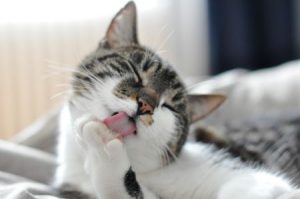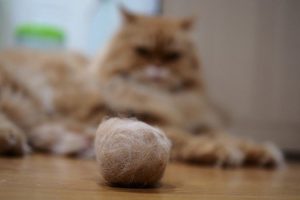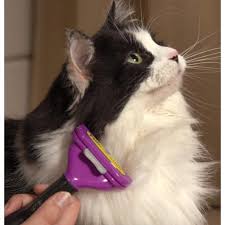It’s Hairball Awareness Day, so here is some information to help with hairball control among your feline friends.

Hairballs are an unfortunate reality for both cats and their owners: while cat owners cringe at the familiar hunching, hacking and gulping that signals their pet is about to expel a hairball, the poor kitty looks to be just as distressed as he gyrates and gags in an effort to rid his stomach and throat of the unwanted fur.

What Causes Cat Hairballs?
Cats are notoriously clean animals, spending hours every day grooming their fur. This inevitably leads the cat to ingest some of his own fur, which often simply passes through the digestive system into the cat’s stool. Cats that are particularly furry, have slow digestive systems and those who are prone to excessive shedding may be unable to pass all the excessive fur through their stool, leading to the uncomfortable buildup of matted hair in their stomach. To relieve the bloating that hairballs can cause, cats will “hack up” the blockage.
Preventing Hairballs in Cats
The best way to prevent hairballs is to brush and groom your cats frequently using a specialized grooming tool such as the Furminator (www.furminator.com). You may also want to enlist the help of a professional groomer who can de-shed and clip the cat’s fur shorter; this minimizes the excess fur that leads to hairballs in cats.
 If you want to keep a long coat long, a regular monthly deshedding session is recommended. If you prefer to clip your cat’s coat short (which usually means little to no brushing is needed), expect to see your groomer every 1 to 3 months. Alternately, you can likely keep up with it yourself if you faithfully brush on a daily basis.
If you want to keep a long coat long, a regular monthly deshedding session is recommended. If you prefer to clip your cat’s coat short (which usually means little to no brushing is needed), expect to see your groomer every 1 to 3 months. Alternately, you can likely keep up with it yourself if you faithfully brush on a daily basis.
There are also supplements designed to help lubricate the cat’s insides, making it easier for the excess fur to move downward into the digestive tract and out through the cat’s stool. And some pet food manufacturers offer anti-hairball formulations; this kitty food is usually higher in fiber and moisture content to help cats that have difficulty processing excess fur through their digestive tract.
When Should I See a Vet About Hairballs?
While a cat hairball is a normal and common affliction with cats, it should not be happening frequently. If your cat is vomiting frequently with, or without, hair in the vomit, you should visit your veterinarian because this can be an indicator of other health issues. Your vet can provide specific guidance on which hairball remedies might work best for your cat and investigate if there are other health problems contributing to hairball, or vomiting, occurrences. The inability to pass hair through the digestive system can be an indicator that the digestive system is not operating efficiently. A thorough exam can provide insight as to what is causing the slowdown of the gastrointestinal system.
If your cat is dealing with hairballs with increasing frequency it does not mean there is a more serious underlying issue, the solution may be as simple as increasing their brushing sessions or changing their food. But, it is best to consult with your veterinarian so that you can ensure you are keeping your beloved pet in the best health possible!
To get started with Passionately Pets, call us today at 571-438-2323 or visit our website www.passionatelypets.com to schedule your consultation.
Passionately Pets has been a trusted pet care provider in Northern Virginia since 2007. We proudly provide dog walking, pet sitting and overnight services for dogs, cats and other companion animals in Arlington, Alexandria, Annandale and Falls Church. Visit our website, www.passionatelypets.com, to request a consultation or more information. For more pet filled content, follow us on Instagram and like us on Facebook @passionatelypets.




Leave a Reply